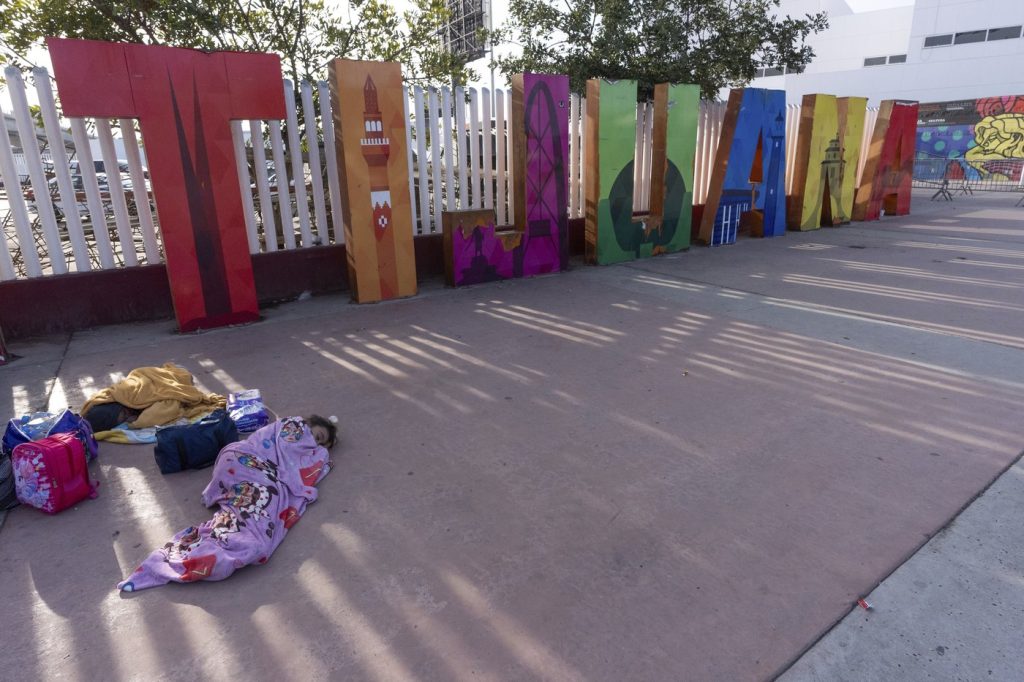ATOTONILCO DE TULA, Mexico (AP) — Dayana Castro, a 25-year-old migrant from Venezuela, faced a significant setback when her long-awaited U.S. asylum appointment was abruptly canceled. With no prospects back home, Castro, her husband, and their two young children made the difficult decision to continue their journey northward despite the risks involved.
The family had already navigated the treacherous Darien Gap jungle separating Colombia and Panama, facing threats from criminal groups targeting vulnerable migrants. They were among tens of thousands who had secured appointments to apply for U.S. asylum, only to have those plans derailed after President Donald Trump took office. Trump's executive orders aimed at tightening border security effectively halted the use of the CBP One app, which had allowed nearly 1 million individuals, including many asylum seekers, to legally enter the U.S. since January 2023.
Determined not to give up after enduring so much hardship, Castro expressed her commitment to press on. "We're going to keep going," she declared from a shelter in central Mexico as her family rode a freight train north. "If we don’t put ourselves at risk, we’ll never arrive." This resolve is echoed among many migrants who now face an unpredictable future, opting for more perilous routes, utilizing smuggling services, and evading authorities instead of seeking asylum in Mexico.
On January 20, 2025, Trump declared a national emergency at the U.S.-Mexico border intending to send U.S. troops and impose stricter restrictions on refugees and asylum seekers, citing a desire to curb illegal immigration and border crime. These measures followed a decrease in illegal crossings in recent months. Supporters argue that the CBP One app helped create a more orderly border process, while critics contend it merely attracted more immigrants.
Adam Isacson, an analyst focused on human rights, warns that the consequences of Trump's aggressive immigration policies could be dire. Valid asylum seekers may face life-threatening situations in their home countries, while others from nations like Venezuela, Cuba, and Haiti may find themselves in vulnerable positions as they traverse the Americas without adequate protection or resources.
As Castro contemplated the implications of her canceled appointment, she recognized the dangers that lay ahead—rising extortion and kidnapping threats from cartels targeting migrants. "There's the train, the cartels, migration police, and they all make you pay them," she lamented. Yet, she clung to the hope that reaching the U.S. was their only option after everything they had experienced.
Elsewhere in Mexico, another Cuban migrant, Rosalí Martínez, sought refuge in the Mexican Commission for Refugee Aid, choosing a different avenue. Traveling with her child, she aimed to reunite with her husband in the U.S., but as the political climate shifted, she found herself considering staying in Mexico instead. "I'm going to stay here and see what happens," she said, declaring her unwillingness to return to Cuba amid its economic downturn.
The tightening of U.S. immigration policies has led many to reconsider their options, with some even contemplating returning to their home countries—a daunting prospect given the lack of pathways and resources. Enrique Vidal Olascoaga, director of the Fray Matías de Córdova human rights center, noted that many are now hesitating about their next steps and openly asking how they might return home.
Jomaris Figuera, who had invested years trying to escape the devastation of Venezuela, expressed her disillusionment after receiving the news that their asylum appointment was canceled. After enduring hardships while picking coffee in Colombia for over four years and waiting in a precarious migrant camp in Mexico City, Figuera’s family now faces the prospect of retracing their steps through the perilous terrains of Central America to return to Venezuela. "It's like abandoning everything after everything that’s happened to us," she said, conveying her despair.










